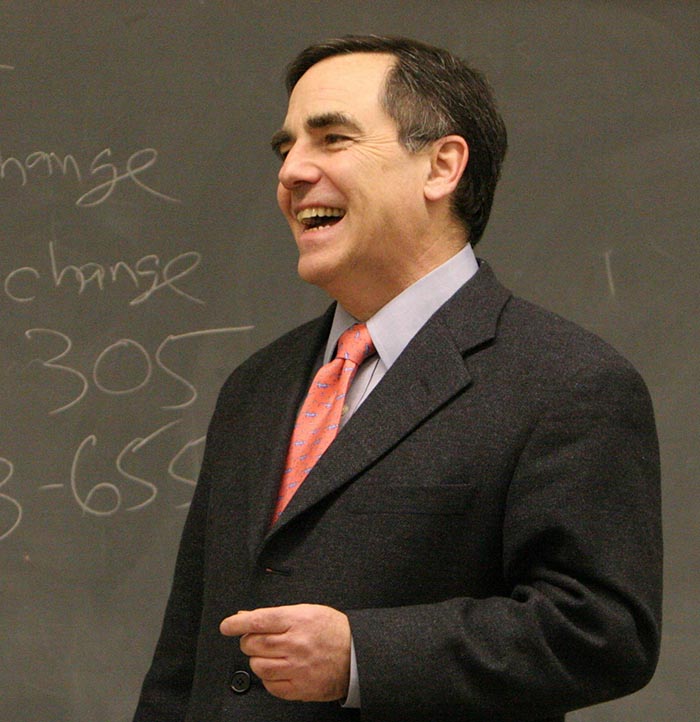Have you ever wondered how the word 'like' became, like, a thing people say all the time? Or why Siri doesn't always understand what you're asking?
The search for answers to questions like this is part of a field called linguistics - the systematic, scientific analysis of human language. Majoring in linguistics can take you down any number of career paths, among them computer and artificial intelligence-related fields, translation, publishing, editing, anthropology, education, speech therapy, and law.
The Major and Programs
Human affairs revolve around language. Linguistics enables students to understand the inner workings of this most special human tool: how and why communication happens or fails to happen, how language creates solidarity and division among groups, how the structure of language is the structure of human intelligence.
Hofstra is unique – it is the only University in the Americas where students can pursue a graduate degree in Forensic Linguistics. Undergraduates may take a course that explores the field, and qualified undergraduate students may take graduate courses in forensic linguistics during their senior year or may seek admission into the combined BA/MA in Linguistics: Forensic Linguistics.
Major in Linguistics
Required courses for a degree in linguistics include Introduction to Linguistics; Phonetics and Phonology (the study of speech sounds and patterns of sound in different languages); Morphology and Syntax (the analysis of sentence structure and grammar); and a course in sociolinguistics, which explores how language is used in society.
Dual Degree BA/MA Linguistics: Forensic Linguistics
Qualified undergraduate students may elect to enroll in a dual-degree program, combining their undergraduate bachelor's degree in linguistics with a master's degree in linguistics: forensic linguistics.
Hofstra's forensic linguistics program was the first of its kind in the nation in a field that is increasingly used as a tool of legal professionals, law enforcement, and the intelligence community around the world.
Learn from the Experts
Meet Dr. Robert Leonard
Dr. Leonard is professor of linguistics and director of the Institute for Forensic Linguistics, Threat Assessment, and Strategic Analysis. He is director of the graduate program in linguistics: forensic linguistics and heads the innovative Forensic Linguistics Justice Project. Dr. Leonard has consulted with the FBI and police and counterterrorism and intelligence agencies throughout the U.S., Canada, and the U.K.
Dr. Leonard is a past recipient of Hofstra's "Teacher of the Year" award.

The Outlook
For more information on careers in linguistics - in education, industry, government, and the arts - visit the Linguistics Society of America website.
Indeed also spotlights the professional opportunities in this field, including linguists, copy editors, copywriters, translators, technical writers, and computational linguists.
Alumni outcomes
89% of 2020-2021 alumni from the School of Humanities, Fine & Performing Arts responding to Hofstra's Alumni Outcomes Survey reported finding employment or attending or planning to attend graduate school.
These alumni reported a mean annual salary of $49K in the months following their graduation.
Where our graduates are working
84% of recent linguistics alumni reporting employment responded that they landed their positions within six months of graduation. Examples of where they have reported working include:
- Autism Education and Therapy Center
- Burma Task Force USA
- Holocaust Memorial And Tolerance Center Of Nassau County
- John Wiley & Sons, Inc.
- Lindamood-Bell Learning Processes
- Lloyds Banking Group
- Peace Corps
- St. Martin's Press
- World Class Language Solutions
Graduate studies
Examples of the academic institutions where our graduates are pursuing advanced degrees include:
- Adelphi University
- Ball State University
- Cornell University
- Hofstra University
- Long Island University
- Northeastern University
- Pace University
- University of Alabama
- Wayne State University
- Yeshiva University
Contact Us
Co-Director of the Linguistics Program and Adviser
Tammy Gales, PhD
Associate Professor of Linguistics
Room 313 Calkins Hall
Phone: 516-463-5435
Email
Director of the Linguistics Program and the Forensic Linguistics Institute
Robert A. Leonard, PhD
Professor of Linguistics
Room 309 Calkins Hall
Phone: 516-463-5440
Email
Office Information
Dept. of Comparative Literature, Languages & Linguistics
Room 322 Calkins Hall
Phone: 516-463-5434
Fax: 516-463-7082
Monday-Friday, 9 a.m.-5 p.m.

